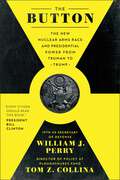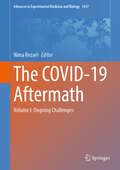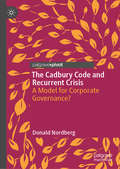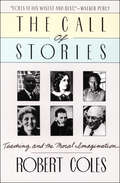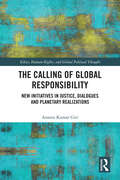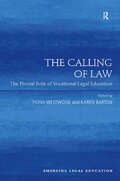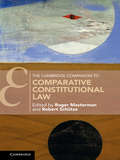- Table View
- List View
The Button: The New Nuclear Arms Race and Presidential Power from Truman to Trump
by William J. Perry Tom Z. CollinaThe President has the power to end the world in minutes. Right now, no one can stop him. Since the Truman administration, America has been one "push of a button" away from nuclear war—a decision that rests solely in the hands of the President. Without waiting for approval from Congress or even the Secretary of Defense, the President can unleash America's entire nuclear arsenal. Almost every governmental process is subject to institutional checks and balances. Why is potential nuclear annihilation the exception to the rule? For decades, glitches and slip-ups have threatened to trigger nuclear winter: misinformation, false alarms, hacked warning systems, or even an unstable President. And a new nuclear arms race has begun, threatening us all. At the height of the Cold War, Russia and the United States each built up arsenals exceeding 30,000 nuclear weapons, armed and ready to destroy each other—despite the fact that just a few hundred are necessary to end life on earth. From authors William J. Perry, Secretary of Defense in the Clinton administration and Undersecretary of Defense for Research and Engineering in the Carter administration, and Tom Z. Collina, the Director of Policy at Ploughshares Fund, a global security foundation in Washington, DC, The Button recounts the terrifying history of nuclear launch authority, from the faulty 46-cent microchip that nearly caused World War III to President Trump's tweet about his "much bigger & more powerful" button. Perry and Collina share their firsthand experience on the front lines of the nation's nuclear history and provide illuminating interviews with former President Bill Clinton, former Secretary of Defense Jim Mattis, Congressman Adam Smith, Nobel Peace Prize winner Beatrice Fihn, senior Obama administration officials, and many others. Written in an accessible and authoritative voice, The Button reveals the shocking tales and sobering facts of nuclear executive authority throughout the atomic age, delivering a powerful condemnation against ever leaving explosive power this devastating under any one person's thumb.
The Buy Side: A Wall Street Trader's Tale of Spectacular Excess
by Turney DuffThe Buy Side is Turney Duff's high-adrenaline journey through the trading underworld, as well as a searing look at an after-hours Wall Street culture where sex and drugs are the quid pro quo and a billion isn't enough. In the mid-2000's, Turney Duff was, to all appearances, the very picture of American success. One of Wall Street's hottest traders, he was a rising star with Raj Rajaratnam's legendary Galleon Group before forging his own path. What few knew was that the key to Turney's remarkable success wasn't a super-genius IQ or family connections but rather a winning personality - because the real money wasn't made on the trading floor or behind a computer screen, but in whispered deals in the city's most exclusive nightspots, surrounded by the best drugs and hottest women. For Turney, this created a perilously seductive cycle: the harder he partied, the more connected and successful he became, which meant he could party even harder. In time, he became a walking paradox, an addictive mess after hours, and King of the Street from nine to five. Along the way, he learned some important lessons about himself, and the too-wild-to-believe world of Wall Street trading. In The Buy Side, the money is plentiful and the after-hours indulgence even more so, which has proved to be a bestselling and box office winning combination, as the success of The Wolf of Wall Street attests. Fans of Martin Scorsese's film and Michael Lewis's Liar's Poker and The Big Short will want to take a walk on The Buy Side.
The Buyer: The making and breaking of an undercover detective
by Liam ThomasAn undercover detective is a buyer, and their commodity is intelligence. But what is the real price of justice?'A compelling and powerful account from the darker side of policing and the terrifying impact it has on those who strive to keep us safe' Nazir AfzalLiam Thomas was an officer in the Met for over a decade, many of those years spent deep at the heart of Britain's most dangerous criminal enterprises in the murky world of undercover surveillance. Before him, his father had also been a police officer, a pillar of their small community.Fighting corruption was Liam's life. But the murky world of undercover work teaches him that justice is far from black and white - and a family secret reveals that corruption is closer to home than he had ever expected. The revelations push him to the edge of his sanity - and then he discovers that his bosses are investigating him...A thrilling memoir of a life lived amongst a world of corruption, justice and loyalties, this book tells the real story of the police's line of duty.
The Buzzard Table
by Margaret MaronNew York Times bestselling author Margaret Maron returns with a thrilling new Deborah Knott mystery . . . THE BUZZARD TABLE Judge Deborah Knott and her husband, Sheriff's Deputy Dwight Bryant, are back home in Colleton County amid family and old friends. But the winter winds have blown in several new faces as well. Lt. Sigrid Harald and her mother, Anne, a well-known photographer, are down from New York to visit Mrs. Lattimore, Anne's dying mother. When the group gathers for dinner at Mrs. Lattimore's Victorian home, they meet the enigmatic Martin Crawford, an ornithologist researching a book on Southern vultures. He's also Mrs. Lattimore's long-lost nephew. With her health in decline, Mrs. Lattimore wants to make amends with her family-a desire Deborah can understand, as she, too, works to strengthen her relationship with her young stepson, Cal. Anne is charmed by her mysterious cousin, but she cannot shake the feeling that there is something familiar about Martin . . . something he doesn't want her or anyone else to discover. When a string of suspicious murders sets Colleton County on edge, Deborah, Dwight, and Sigrid once again work together to catch a killer, uncovering long-buried family secrets along the way.
The CEO Pay Machine: How it Trashes America and How to Stop it
by Steven CliffordThe former top CEO examines the scandalous and corrupt reasons behind obscene pay packages for corporate executives—and explains how this hurts all of us--and how we can stop it. Today, the pay gap between chief executive officers of major U.S. firms and their workers is higher than ever before—depending on the method of calculation, CEOs get paid between 300 and 700 times more than the average worker. Such outsized pay is a relatively recent phenomenon, but despite all the outrage, few detractors truly understand the numerous factors that have contributed to the dizzying upward spiral in CEO compensation. Steven Clifford, a former CEO who has also served on many corporate boards, has a name for these procedures and practices— "The CEO Pay Machine." The CEO Pay Machine is Clifford's thorough and shocking explanation of the 'machine'--how it works, how its parts interact, and how every step pushes CEO pay to higher levels. As Clifford sees it, the payment structure for CEOs begins with shared delusions that reinforce one other: Once this groupthink is accepted as corporate dogma, it becomes infinitely harder to see any decision as potentially irrational or dysfunctional. Yet, as Clifford notes, the Pay Machine has caused immeasurable harm to companies, shareholders, economic growth, and democracy itself. He uses real-life examples of the top four CEOs named the highest paid in 2011 through 2014. Clifford examines how board directors and compensation committees have directly contributed to the rising salaries and bonuses of the country's richest executives; what's more, Clifford argues, each of those companies could have paid their CEOs 90 percent less and performed just as well.Witty and infuriating, The CEO Pay Machine is a thorough and incisive critique of an economic issue that affects all American workers.From the Hardcover edition.
The CEO's Boss: Tough Love in the Boardroom (Columbia Business School Publishing)
by William KlepperThe CEO’s Boss, originally published in 2010, is the definitive guide to a productive working relationship between corporate boards and CEOs. Speaking to an era when company directors must monitor the actions and day-to-day operations of their CEO, William M. Klepper offers eight essential lessons to help boards operate more effectively in this bold and independent role. Since the publication of the first edition, Klepper has continued to develop and apply its lessons for a variety of businesses and settings.In this second edition, Klepper renews the paradigm set forth in the first, with new case studies of companies such as Wells Fargo, BP, Hewlett-Packard, and Proctor & Gamble. Giving directors, executives, investors, and stakeholders the tools to make crucial relationships work, Klepper details the best techniques for selecting the right CEO, establishing a working relationship, and giving effective feedback. He affirms the importance of the social contract between directors and their CEOs, encourages directors to embrace their independence, and teaches executives to value tough love. He revisits the first edition’s case studies and derives new insights from how these companies followed—or failed to heed—the book’s precepts. He also takes a close look at the predictions he made almost ten years ago, providing new forecasts and integrating core knowledge to ensure that The CEO’s Boss remains essential in our ever-changing business landscape.
The CEO's Boss: Tough Love in the Boardroom (Columbia Business School Publishing)
by William KlepperIn order to avoid another Enron, WorldCom, or Tyco, company directors have assumed a bold and independent role in the boardroom, monitoring the actions and day-to-day operations of the CEO. This dramatic shift has created a new dynamic, one that requires careful negotiation from both parties to get the job done. Giving directors, executives, investors, and stakeholders the tools to make this relationship work, William M. Klepper describes the best techniques for building a productive partnership and establishing a plan of action for a variety of businesses and settings.Klepper, an executive educator, has worked with AT&T, Bausch & Lomb, Johnson & Johnson, Sony, Sun Microsystems, and a host of other corporations. He knows what makes a healthy partnership between a board and its CEO and the consequences of a bad fit. In this book, he details the eight practices of successful executives, such as facilitating innovation, motivating change, and developing leadership skills, and he explains what directors need to evaluate, such as working style, social behavior, and the handling of stress, before they commit to hiring a CEO. The most critical element is the social contract, in which directors and their CEOs agree to be transparent, continually reassess their company's risk, maintain core company values, and make a commitment to their stakeholders. These include employees, shareholders, customers, and the community. In this essential volume, Klepper encourages directors to embrace their independence, and he teaches executives to value tough love.
The COVID-19 Aftermath: Volume I: Ongoing Challenges (Advances in Experimental Medicine and Biology #1457)
by Nima RezaeiThis book discusses different challenges imposed to the globe following the COVID-19 pandemic. Coronavirus disease 2019 (COVID-19) has affected humans’ individual lives, communities, and the world. It has not only affected human’s lives but also environmental and natural systems. To better appreciate the pandemic’s influence, multidisciplinary and interdisciplinary approaches are needed. Also, lessons learned from facing the pandemic are reviewed to be used for combating the upcoming challenges in healthcare settings, mental and psychological health, education, natural resources, energy system, environment balance, economic stability, social relations, etc.
The CRC Press Terrorism Reader
by Marie-Helen MarasFrom CRC Press's unrivaled pool of author experts comes the ultimate reader on terrorism. With information drawn from premier titles in the CRC Press collection, it focuses on how to prepare for, mitigate, counter, and respond to terror threats and acts. Policy issues, critical infrastructure protection, terrorism funding, and target selection is discussed, along with weapons of mass destruction, intelligence and antiterrorism efforts, terrorism crisis management, and responder issues. The book goes beyond theory to provide practitioner knowledge from the field straight into the reader‘s hands, delivering real-world solutions to terrorist threats and acts at home and abroad.
The Cabinet of Imaginary Laws
by Peter Goodrich and Thanos ZartaloudisReturning to the map of the island of utopia, this book provides a contemporary, inventive, addition to the long history of legal fictions and juristic phantasms. Progressive legal and political thinking has for long lacked a positive, let alone a bold imaginary project, an account of what improved institutions and an ameliorated environment would look like. And where better to start than with the non-laws or imaginary legislations of a realm yet to come. The Cabinet of Imaginary Laws is a collection of fictive contributions to the theme of conceiving imaginary laws in the vivid vein of jurisliterary invention. Disparate in style and diverse in genres of writing and performative expression, the celebrated and unknown, venerable and youthful authors write new laws. Thirty-five dissolute scholars, impecunious authors and dyspeptic artists from a variety of fields including law, film, science, history, philosophy, political science, aesthetics, architecture and the classics become, for a brief and inspiring instance, legislators of impossible norms. The collection provides an extra-ordinary range of inspired imaginings of other laws. This momentary community of radial thought conceives of a wild variety of novel critical perspectives. The contributions aim to inspire reflection on the role of imagination in the study and writing of law. Verse, collage, artworks, short stories, harangues, lists, and other pleas, reports and pronouncements revivify the sense of law as the vehicle of poetic justice and as an art that instructs and constructs life. Aimed at an intellectual audience disgruntled with the negativity of critique and the narrowness of the disciplines, this book will appeal especially to theorists, lawyers, scholars and a general public concerned with the future of decaying laws and an increasingly derelict legal system.
The Cadaver King and the Country Dentist: A True Story Of Injustice In The American South
by John Grisham Radley Balko Tucker CarringtonA shocking and deeply reported account of the persistent plague of institutional racism and junk forensic science in our criminal justice system, and its devastating effect on innocent livesAfter two three-year-old girls were raped and murdered in rural Mississippi, law enforcement pursued and convicted two innocent men: Kennedy Brewer and Levon Brooks. Together they spent a combined thirty years in prison before finally being exonerated in 2008. Meanwhile, the real killer remained free.The Cadaver King and the Country Dentist recounts the story of how the criminal justice system allowed this to happen, and of how two men, Dr. Steven Hayne and Dr. Michael West, built successful careers on the back of that structure. For nearly two decades, Hayne, a medical examiner, performed the vast majority of Mississippi's autopsies, while his friend Dr. West, a local dentist, pitched himself as a forensic jack-of-all-trades. Together they became the go-to experts for prosecutors and helped put countless Mississippians in prison. But then some of those convictions began to fall apart.Here, Radley Balko and Tucker Carrington tell the haunting story of how the courts and Mississippi's death investigation system--a relic of the Jim Crow era--failed to deliver justice for its citizens. The authors argue that bad forensics, structural racism, and institutional failures are at fault, raising sobering questions about our ability and willingness to address these crucial issues.
The Cadbury Code and Recurrent Crisis: A Model for Corporate Governance?
by Donald NordbergThis book raises questions about a hallmark mechanism of corporate governance – the use of codes of practice. It undertakes a critical examination of the origins and development of the UK code of corporate governance, which influenced codes devised around the world and practices of organisations well beyond the world of corporations listed on stock exchanges. Much lauded as a model of good governance, its core principles have persisted for almost 30 years. Yet during that time repeated crises in corporate governance have arisen, suggesting that it has not fully addressed the problem it was meant to solve. This book will be valuable reading for scholars working on business ethics, corporate governance, and business history.
The Cage: A Novel
by Bonnie Kistler“A delicious thrill-ride of breakneck twists and turns. . . . Evoking Grisham and Highsmith, Bonnie Kistler is a masterful plate-spinner of plot, deftly weaving together the worlds of fashion, high finance and white-shoe law to reveal their seamiest secrets and shared underbellies, all via characters who live, breathe, and scare the hell out of us on every page.”—Cassidy Lucas, author of Santa Monica“An absolutely spellbinding thriller. . . . An utterly engrossing and thoroughly entertaining story.”—Booklist (starred review)Combining the propulsive narrative drive of The Firm with the psychological complexity of The Silent Patient, a gripping and original thriller about two professional women—colleagues at an international fashion conglomerate—who enter an elevator together . . . but only one is alive when they reach the ground floor.On a cold, misty Sunday night, two women are alone in the offices of fashion conglomerate Claudine de Martineau International. One is the company’s human resources director. Impeccably dressed and perfectly coiffed, she sits at her desk and stares somberly out the window. Down the hall, her colleague, one of the company’s lawyers, is buried under a pile of paperwork, frantically rushing to finish. Leaving at the same time, the two women, each preoccupied by her own thoughts, enter the elevator that will take them down from the 30th floor.When they arrive at the lobby, one of the women is dead. Was it murder or suicide?An incredibly original novel that turns the office thriller on its head, The Cage is a wild ride that begins with a bang and picks up speed as it races to its dramatic end.
The California Landlord's Law Book: Evictions
by Nils RosenquestYour step-by-step guide to evicting a problem tenant in California Sooner or later, nearly every residential landlord has to evict a tenant for nonpayment of rent, property damage, an illegal sublet (including Airbnb), or another violation of the lease or the law. You don’t always need to hire a lawyer, but you do need reliable information, particularly if your property is under rent control. Here, you’ll find all of the downloadable forms you need along with clear, step-by-step instructions on how to: prepare nonpayment of rent notices, prepare 3-, 30-, 60-, and 90-day notices, complete and serve all required eviction forms deal with tenants’ delaying tactics, and file your “unlawful detainer” complaint in court. <p><p>Just filing an eviction lawsuit often prompts the tenant to leave. If it doesn’t, you’ll learn how to: handle a contested eviction suit by yourself—and know when to get professional help, respond to a tenant’s defenses and claims, evict a tenant who has filed for bankruptcy or is occupying property you purchased at a foreclosure sale understand your options for collecting “Covid rent,” and collect unpaid rent after you win.
The Caliphate of Man: Popular Sovereignty in Modern Islamic Thought
by Andrew F. MarchIslamist thinkers used to debate the doctrine of the caliphate of man, which holds that God is sovereign but has appointed the multitude of believers as His vicegerent. Andrew March argues that the doctrine underpins a democratic vision of popular rule over governments and clerics. But is this an ideal regime destined to survive only in theory?
The Call To Be Human: Making Sense Of Morality
by Vincent MacNamaraConcerned with the notions of morality that Christians have inherited, Vincent MacNamara revisits a topic he wrote about in his widely used and much loved The Truth in Love. Going to the heart of the matter of morality and situating it in the call to be human, MacNamara here displays a sympathetic understanding of the human condition and the demands of modern life.
The Call of Character: Living a Life Worth Living
by Mari RutiShould we feel inadequate when we fail to be healthy, balanced, and well-adjusted? Is it realistic or even desirable to strive for such an existential equilibrium? Condemning our current cultural obsession with cheerfulness and "positive thinking," Mari Ruti calls for a resurrection of character that honors our more eccentric frequencies and argues that sometimes a tormented and anxiety-ridden life can also be rewarding. Ruti critiques the search for personal meaning and pragmatic attempts to normalize human beings' unruly and idiosyncratic natures. Exposing the tragic banality of a happy life commonly lived, she instead emphasizes the advantages of a lopsided life rich in passion and fortitude. She also shows what matters is not our ability to evade existential uncertainty but our courage to meet adversity in such a way that we do not become irrevocably broken. We are in danger of losing the capacity to cope with complexity, ambiguity, melancholia, disorientation, and disappointment, Ruti warns, leaving us feeling less "real" and less connected and unable to process a full range of emotions. Heeding the call of our character means acknowledging the marginalized, chaotic aspects of our being, and it is precisely these creative qualities that make us inimitable and irreplaceable.
The Call of Stories: Teaching and the Moral Imagination
by Robert ColesFrom the Pulitzer Prize-winning author of Children of Crisis, a profound examination of how listening to stories promotes learning and self-discovery. As a professor emeritus at Harvard University, a renowned child psychiatrist, and the author of more than forty books, including The Moral Intelligence of Children, Robert Coles knows better than anyone the transformative power of learning and literature on young minds. In this &“persuasive&” book (The New York Times Book Review), Coles convenes a virtual symposium of college, law, and medical school students to explore the phenomenon of storytelling as a source of values and character. Here are transcriptions of classroom conversations in which Coles and his students discuss the impact of particular works of literature on their moral development. Here also are Coles&’s intimate personal reflections on his experiences in the civil rights movement, his child psychiatry practice, and his interactions with his own literary mentors including William Carlos Williams and L.E. Sissman. The life lessons learned from these stories are of special resonance to doctors and teachers looking to apply them in classroom and clinical environments. The rare public intellectual to be honored with a MacArthur Award, a Presidential Medal of Freedom, and a National Humanities Medal, Robert Coles is a true national treasure, and The Call of Stories is, in the words of National Book Award winner Walker Percy, &“Coles at his wisest and best.&”
The Call to Conversion
by Jim WallisPut Your Faith into Action A leading voice at the crossroads of faith and politics offers a prophetic appeal for our times: faced with a growing gap between the rich and poor, bombarded by national security alerts that ratchet up our stress levels, taxed by a government that spends billions of dollars on war -- where do we find hope? In this revised and updated edition of his classic, Jim Wallis insightfully critiques contemporary culture and politics, inspiring us with stories to convert our way of thinking and point to a solution to our current social and political dilemmas.
The Calling of Global Responsibility: New Initiatives in Justice, Dialogues and Planetary Realizations (Ethics, Human Rights and Global Political Thought)
by Ananta Kumar GiriThis book rethinks and transforms the current discourse on globalization and global justice. It expands the idea of globalization from an economic or corporate context to mean humanization and planetary realizations — moving beyond the boundaries of nation-states and other human-made demarcations. The author challenges the notion of human primacy and makes a fervent call to reconfigure the paradigm of anthropocentrism. Through a careful study of movements for justice and inter-faith dialogue from across the world, the book makes a unique contribution to the emerging study of global responsibility. It also helps us overcome our current civilizational crises and cultivate a new civilization of planetary care and co-responsibility. Part of the Ethics, Human Rights and Global Political Thought series, the volume will be of great interest to scholars and researchers of law and society, especially social movements, political theory and philosophy.
The Calling of Law: The Pivotal Role of Vocational Legal Education (Emerging Legal Education)
by Fiona Westwood and Karen BartonAs one of the ’learned’ professions requiring advanced learning and high principles, law enjoys a special standing in society. In return for its status and rank, the legal profession is expected to exhibit the highest levels of honesty, trust and morality, the very values which underpin the legal system itself. This, in turn, entrusts to legal education a particular problem of addressing, not only the substantive elements of the body of law, but a means through which the characteristics of the ’calling’ of law are imparted and instilled. At a time when the very essence of the legal profession is under threat, this book calls for a realignment of the legal curriculum and pedagogies so as to emphasise the development of culture over industry; character over eloquence; and calling over skill. Chapters are grouped around the core content and key themes of Curiosity, Calling, Character and Conscientiousness, Contract, and Culture. The volume includes contributions from leading experts, drawn internationally and from other professional disciplines in order to present alternative approaches aimed at tackling common issues, providing insight, and provoking debate.
The Cambridge Companion to Ancient Greek Law
by Michael Gagarin David CohenThis Companion volume provides a comprehensive overview of the major themes and topics pertinent to ancient Greek law. A substantial introduction establishes the recent historiography on this topic and its development over the last 30 years. Many of the 22 essays, written by an international team of experts, deal with procedural and substantive law in classical Athens, but significant attention is also paid to legal practice in the archaic and Hellenistic eras; areas that offer substantial evidence for legal practice, such as Crete and Egypt; the intersection of law with religion, philosophy, political theory, rhetoric, and drama, as well as the unity of Greek law and the role of writing in law. The volume is intended to introduce non-specialists to the field as well as to stimulate new thinking among specialists.
The Cambridge Companion to Aristotle's Nicomachean Ethics
by Ronald PolanskyAristotle's Nicomachean Ethics is the first and arguably most important treatise on ethics in Western philosophy. It remains to this day a compelling reflection on the best sort of human life and continues to inspire contemporary thought and debate. This Cambridge Companion includes twenty essays by leading scholars of Aristotle and ancient philosophy that cover the major issues of this foundational text. The essays in this volume shed light on Aristotle's rigorous and challenging thinking on questions such as: Can there be a practical science of ethics? What is happiness? Can we arrive at convincing accounts of virtues? Are we responsible for our character? How does moral virtue relate to good thinking? Can we act against our reasoned choice? What is friendship? Is the contemplative life the highest kind of life?
The Cambridge Companion to Christian Ethics
by Robin GillFollowing the same formula as other Cambridge Companions, this book is written by leading international experts in Christian ethics and is aimed at students on upper-level undergraduate courses, at teachers and at graduate students. It will be useful as well to ministers and other professionals within the church. Its eighteen chapters provide a thorough introduction to Christian ethics which is both authoritative and up-to-date. All contributors have been chosen because they are significant scholars with a proven track record of balanced, comprehensive and comprehensible writing. The Companion examines the scriptural bases of ethics, introduces a variety of approaches to ethics including those informed by considerations such as gender and by other faiths such as Judaism, and then discusses Christian ethics in the context of contemporary issues including war and the arms trade, social justice, ecology, economics, and medicine and genetics. The book offers a superb overview of its subject.
The Cambridge Companion to Comparative Constitutional Law (Cambridge Companions to Law)
by Roger Masterman Robert SchützeWhat is the purpose of comparative constitutional law? Comparing constitutions allows us to consider the similarities and differences in forms of government, and the normative philosophies behind constitutional choices. Constitutional comparisons offer 'hermeneutic' help: they enable us to see 'our' own constitution with different eyes and to locate its structural and normative choices by references to alternatives evident in other constitutional orders. This Cambridge Companion presents readers with a succinct yet wide-ranging companion to a modern comparative constitutional law course, offering a wide-ranging yet concise introduction to the subject. Its twenty-two chapters are arranged into five thematic parts: starting with an exploration of the 'theoretical foundations' (Part I) and some important 'historical experiences' (Part II), it moves on to a discussion of the core 'constitutional principles' (Part III) and 'state institutions' (Part IV); finally it analyses forms of 'transnational' constitutionalism (Part V) that have emerged in our 'global' times.
